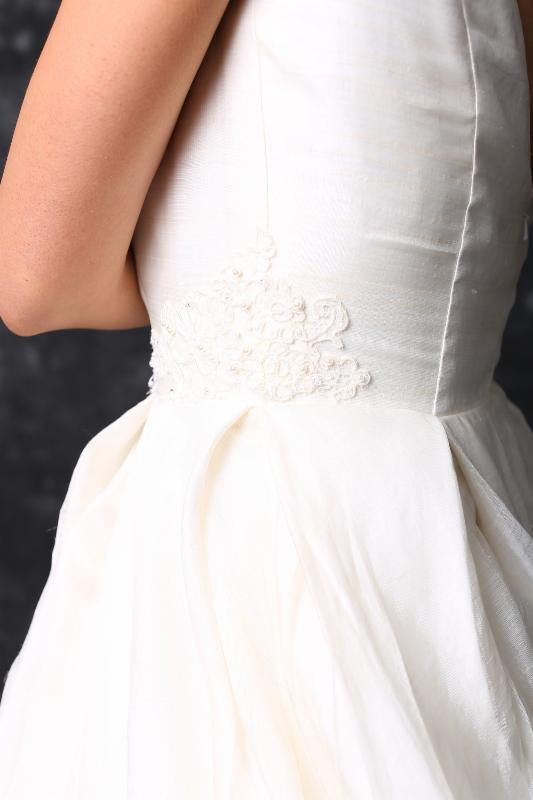
Recycled pineapple and silk dress by Rania Hatoum.
When I set out to find myself the perfect, sustainable and ethically made wedding dress, I thought it was just about finding an eco-friendly wedding dress designer I liked and picking out a favorite.
A version of this article previously appeared on Ecocult.
It was not that simple. Yes, there are several designers proudly proclaiming their eco-friendly bonafides. But there aren’t enough to fulfill the various styles and dreams of every conscious bride. In other words, just because I have the heart of a flower child–concerned as I am about pesticide use and child labor–doesn’t necessarily mean I want to look like a flower child on my wedding day.
I’m not alone, here. I recently got an email from a reader who says she’s also a little frustrated with her options. She’s looking for something affordable, sustainable, and pretty.
Well, you just have to get a little creative! And I’m not talking about DIYing your dress out of used plastic bags. I’m speaking of defining what sustainability means to you, and searching for dresses that fit within those parameters, instead of just Googling: “eco-friendly wedding dress.”
I myself went through this entire process. I held my nose and walked around a wedding dress trade show, asking bewildered designers nitpicky questions about their lace sourcing. I visited three different bridal boutiques with my mother, sister, and bridesmaid, asking a lot of nitpicky questions about how those gold sequins got there. I went into the belly of the beast, an uptown bridal salon with a dressing room the size of my bedroom, a stage with downlighting, and free champagne (I barely made it out of there alive).
In the end, I settled on a bespoke hemp/silk dress from the sustainable designer Susana Colina after a visit to her apartment/studio in Brooklyn. She has several white dresses in her latest collection, but she’s not expressly a wedding dress designer. Once I thought out of the box, it became so abundantly clear a dress from her was the right choice. Sustainable, ethical, and by a Venezuelan woman–it’s a fitting way to incorporate another touch from my fiancé’s home country, intertwined with my passion for sustainability. Plus, well, the dress I chose is incredible and just my style.
So let me walk you through all your options and avenues for finding the perfect dress that fits both your personal style and values.
1. Consider what you want and what you’re able to afford.
There’s a saying: you can have it two of three ways–fast, cheap, good–but not all three. When it comes to wedding dresses, you can have it three of four ways–sustainable, traditional, new, affordable–but not all four. That’s because real silk sewn and embellished by fairly paid workers is more expensive than polyester and beading done by child labor. Traditional dresses, with their layers upon layers and embellishment, are more expensive than simple, modern gowns (and require a visit to the salon to try them on, rather than just buying it offline!). And of course, new dresses are more expensive than used ones. So if you want a new, traditional, sustainable dress, be prepared to pay. However, if you are open to a modern gown, or a vintage or used gown, then a world of options open up. For more on this, I suggest you read my story at Refinery29 on why wedding dresses cost what they do. One more thing: if you’re vegan, you might want to think about getting a cotton voile gown, or maybe you actually do prefer a polyester gown. Things to think about.
2. Buy from a sustainable and eco-friendly bridal designer.
The most obvious choice, so let’s start here and see if you can find a dress that speaks to you that is sustainable through and through. The laws of direct-to-consumer apply in the wedding field, too. So if you can find a bridal gown company that does not wholesale to boutiques, you’re likely getting a great deal. The drawback is that if they don’t sell to boutiques, you might have to visit their store in whatever city it’s in, or ask to have them ship samples to you to try on. You could also look through Etsy for handmade and vintage dresses, though that can be a bit of a Wild West. Here are some eco-friendly designers that I recommend:
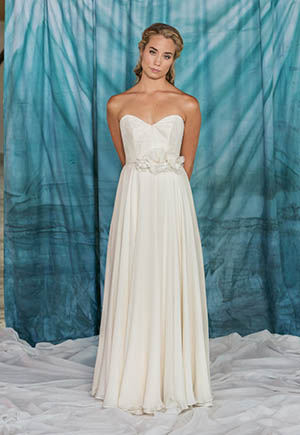
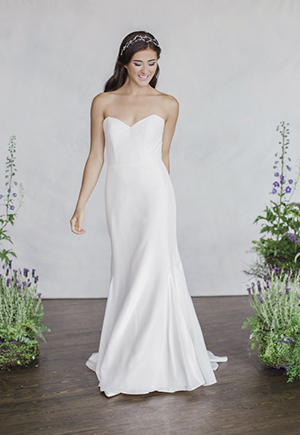
Magnolia – This Vancouver label is dedicated to designing expressly eco and pretty gowns for the conscious bride. Each dress, top, or skirt is made of European lace, Indian silk, organic cotton, vintage, or recycled fabrics. They do vegan and custom gowns, will rework your mom’s old gown, and even sell and rent samples.
The vibe: Botanical garden.
The price: $950 – $3,270 for a full gown.
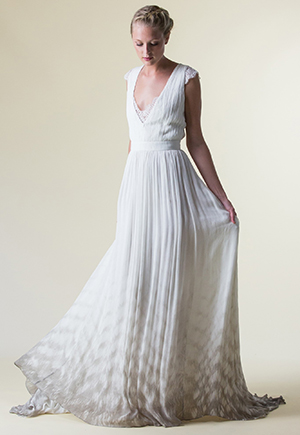
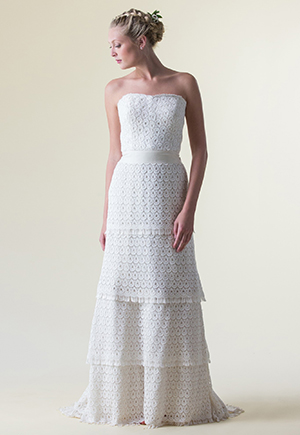
Celia Grace – Dresses from this brand are made in Cambodia with Fair-Trade Cambodian silk, from pesticide-free mulberry trees, and antibiotic-free silk works, woven on traditional wooden looms, and hand-dyed with non-toxic German dyes, with minimal water used in production. For every dress you buy, a school uniform is donated through a non-profit partner. Plus, they offer free, no-risk, at-home try ons and discounted samples.
The vibe: Upstate lake house.
The price:$900 – $2,500
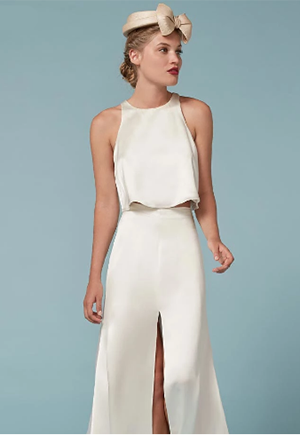
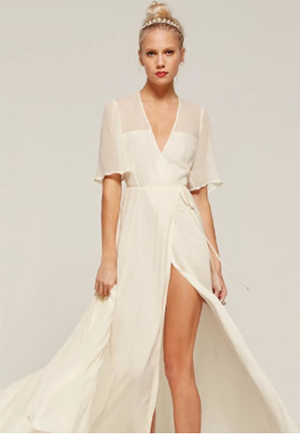
Reformation – This direct-to-consumer brand does sexy, floaty dresses from deadstock material, made in California. Each dress page tells you how much water, CO2, and waste buying a Ref dress instead of a typical dress saves. Check early and often, since Reformation doesn’t go by season, but by whenever they make new dresses. And be aware that these dresses tend to best for women with a fair amount of body confidence – they don’t come with boning or crinoline! I’m having my bridesmaids get their dresses from here, with the hopes that it will actually for real be a dress they will wear again.
The vibe: Buzzy, downtown restaurant.
The price: $275 – $650
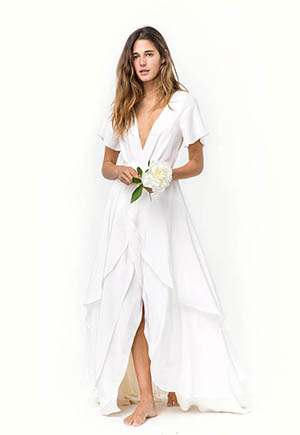
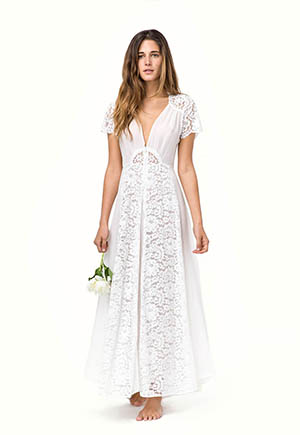
Christy Dawn – This direct-to-consumer dress designer uses deadstock material for her entire ready-to-wear line, including the floaty, modern wedding dresses. Everything is handmade in California. Plus, your dress will arrive in a sustainable, reusable wooden box.
The vibe: Barefoot backyard wedding.
The price: $480 – $1800
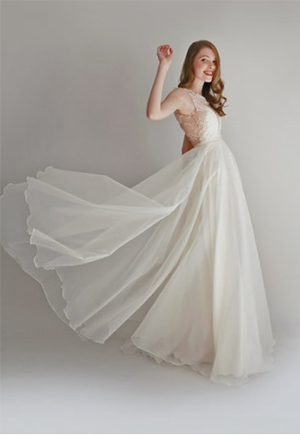
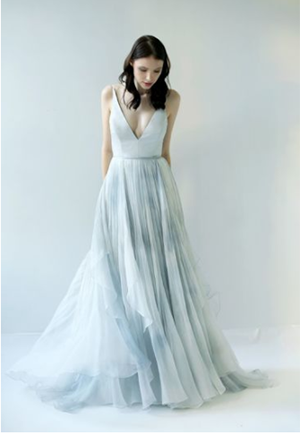
Leanne Marshall – Each of this designer’s gowns are handmade to order out of natural silks and lace, with all the embellishment done right in New York City. (This is important as cheap decorative beading is often done by children in Asia.) Her mix-and-match tops, skirts, overlays, and dresses are available in bridal boutiques across the U.S.
The vibe: Cupcakes and sparklers in a loft.
The price: $1,390 – $5,266 for a whole dress.
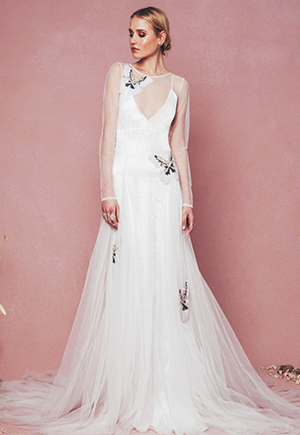
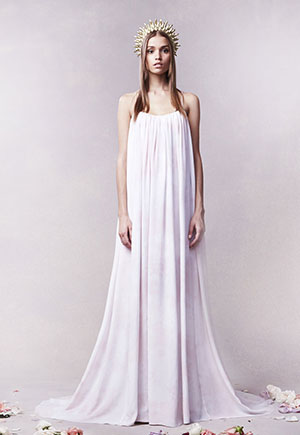
Odylyne the Ceremony – The dresses from this designer are made to order in California of lace, silk, and cotton. I would try to visit their store to try on dresses because once you put in an order for one of these pricey suckers, it’s yours, and they don’t send samples for trying on.
The vibe: California ranch with succulents and crystals.
The price: $2,650 – $6,875
3. Go to a conventional bridal salon and request eco-friendly gowns.
I checked out a few salons in New York City like Schone Bride and Lovely Bride, and there were plenty of options for me! Just don’t expect them to know what you are talking about when you say, “eco-friendly.” Tell them specifics. I was clear with the sales associate that I only wanted to see gowns with no polyester, that were made either in the U.S., Canada, Europe, or Australia–countries with strong labor protections. Some gowns had polyester lining, which I briefly considered letting through, before deciding against it. It’s really up to you what you’re comfortable with! I also tried on a gorgeous gown that was real silk, and had a sort of gold sequin ombré skirt. But they couldn’t tell me where the sequins had been sewn on–the fabric had been bought like that by the designer, so I turned it down. Ask where the lace and silk were made, too.
But caution, this is likely the most expensive option. You’ll get your fairy tale gown, but at a hefty price if you are specifying real silk and it’s made in a Western country.

Loulette Bride
Rosa Clara
Loulette Bride – Made New York City from natural materials such as silk and antique lace and netting. It’s sold in boutiques in California, New York, Michigan, and Oregon.
Jana Starr – Modern wedding gowns from a collection of 100-year-old handmade lace and embroideries, plus 19th-century lace veils.
Rania Hatoum – This designer is not expressly sustainable, but does have one eco dress made of recycled pineapple leaves and spun silk made by fairly paid Philippine women, with organic cotton lining. You can also hand wash it, avoiding any chemicals that come with dry cleaning. Rania Hatoum is stocked in 10 stores across the U.S.
Rosa Clara – Made in Barcelona with textiles made in Spain, some exclusively for Rosa Clara. Not all are pure silk, so proceed with caution and lots of questions.
Rembo Styling – Made of silk and French Chantilly lace in a beautiful production facility in Portugal with lots of natural light and a garden to work in.
Jesus Peiro – Made in Italy of French and Italian fabric.
Amy Kuschel – Made in San Francisco of European silks and lace. (Synthetic or U.S. tulle.)
Paloma Blanca – Made in Canada of Japanese crepe, ribbons, tulle, plus French Lace and Indian silk. (Couldn’t speak to how Indian silk is made.)
Something Blue – Made in Canada of French, Italian, and U.S. textiles.
Edith Élan – Made in Chicago of Californian and European textiles.
Alessandra Rinaudo – Made in Italy from Italian fabrics.
Savin London – Made in London of French and Italian fabrics.
Cicada Bridal – Made in Seattle of silks from China and India.
Lea Ann Belter – Made in Toronto with vegetable-dyed silks from family-owned mill in India. Donates scraps.
Pas de Deux – Made in NYC from silk from Korea and historic mill in New England.
Read more at Ecocult.
We hope this inspires your wedding dress shopping, brides to be! Do you have any additional tips for finding an eco-friendly gown?
Also by Alden: Confessions of a Green Blogger Who Uses Disposable Water Bottles
Related: 5 Ideas for a Greener Wedding
Get more like this—Subscribe to our daily inspirational newsletter for exclusive content!
__
Photo: Respective Brands




